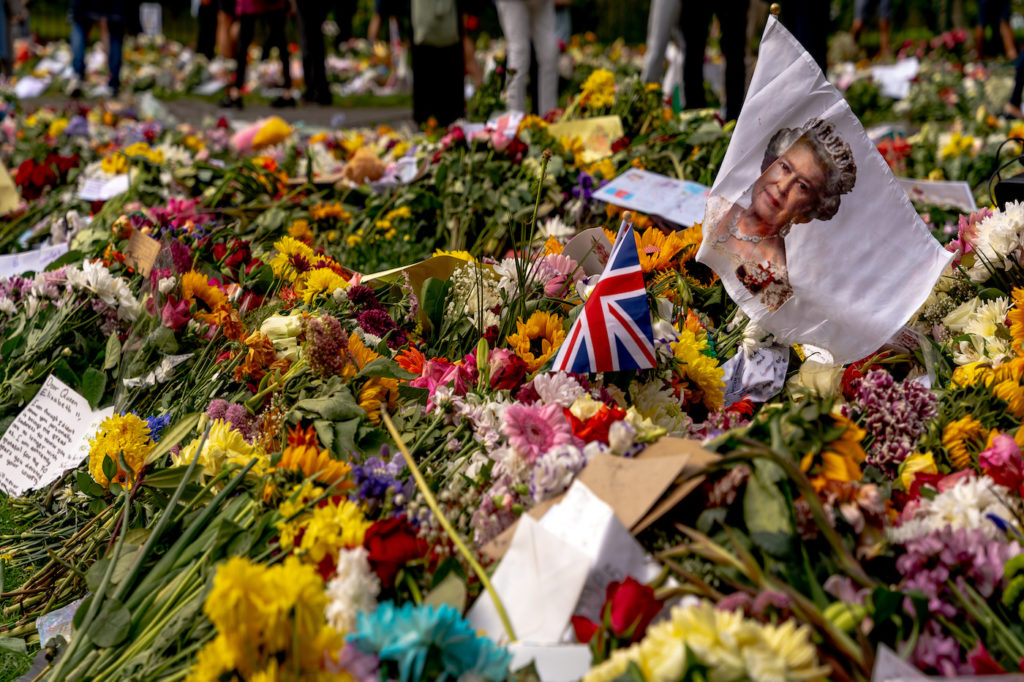In the wake of Queen Elizabeth II’s death on September 8th, President Biden described her as the first British monarch to whom everyone “could feel a personal and immediate connection.” According to a mourner interviewed by The New York Times outside Buckingham Palace, “We all felt we knew her.” Other commentators eagerly claimed familiarity, even intimacy: “The Windsor grandmother I knew,” suggested one portrait in the Financial Times; “The Queen I knew,” claimed another by the BBC’s former royal correspondent.
But here’s the thing: we hardly knew the real Elizabeth at all. To insist, amid the grieving and remembrances, that the Queen was remote and inscrutable is not to be pedantic or churlish. Rather, it is important to acknowledge that the Queen was unknown—unknowable—because from this starting point we can understand how Brits think about the monarchy, and why it endures, even if we might not approve of all it entails.
I am not much of a monarchist. As a British conservative, I hesitate to admit this. After all, if conservatism means respecting the authority of institutions, what could be a greater institution in which authority is capable of being embodied than the monarchy? And what of the other familiar arguments for monarchy: the continuity with history, the transcendence of politics, all those tourist dollars? Like many Brits, I accept the force of those considerations, and I can even allow myself to feel sentimental about monarchy, while also acknowledging that its theoretical basis is hard to defend and that its practical effect is to encourage socially damaging instincts like deference to birth.
And yet the British monarchy persists. In fact, it flourishes. I believe that the system’s unlikely success in an egalitarian age is a consequence of three related and often overlooked factors: British people don’t really know the monarch, so they construct one in their preferred image, and this act of construction results in a sense of ownership that provides an unexpected democratic dimension, while also offering the possibility of reform and renewal.
Start your day with Public Discourse
Sign up and get our daily essays sent straight to your inbox.Blank Slate
In the apophatic theological tradition, God can only be spoken of in terms of negation. We find something similar going on in all the reports that emphasize what the Queen was not—what she didn’t do, what she didn’t reveal. She did not express political opinions, nor did she dictate political events. She did not give conventional interviews, nor did she “open up” to politicians, journalists, or celebrities in private. She did not let the mask slip, nor did she emote—a refusal that briefly imperiled the monarchy in the turbulent aftermath of Princess Diana’s death in 1997. She was largely a blank slate, a cipher. Nobody outside an intimate circle of friends knew her. Of her seventy-year reign, we might say that Paddington Bear supplied the mood music, while Victorian constitutionalist Walter Bagehot recognized the importance of not allowing “daylight in upon magic.”
The Queen was largely a blank slate, a cipher. Of her seventy-year reign, we might say that Paddington Bear supplied the mood music, while Walter Bagehot recognized the importance of not allowing daylight in upon magic.
Still, there were many would-be interpreters of the magic, particularly in the past ten days. In a representative tribute, Andrew Neil suggested that the Queen embodied “increasingly unfashionable” virtues like “duty, responsibility, reserve, civility, modesty.” Perhaps so, but was her (apparent) demonstration of these virtues the natural outgrowth of her traditionalist views, or the function of a stubborn unwillingness to modernize, or the product of a shrewd intuition that the best form of public relations is seeming to be indifferent to public relations? We have no way of knowing. And, more fundamentally, if all of the duties and rituals had been stripped away, who would have remained? Anything resembling Neil’s depiction, or a vacuum that had been carefully concealed? Again: nobody knows. In the NYT obituary, the limits of our knowledge were strained still further with its claim that the Queen’s “personal behavior . . . was beyond reproach, never tainted by even the remotest hint of scandal.” Has there ever existed a human with faultless personal behavior? Is the monarch a myth or a person?
If the Queen was a blank slate, political memoirs are no help in filling in the details. Britain’s most consequential recent leaders, who enjoyed unique access to the monarch, leave us only with platitudes and hunches. This is Margaret Thatcher’s takeaway from eleven years of audiences: “Her Majesty brings to bear a formidable grasp of current issues and breadth of experience.” And here’s Tony Blair’s account of their first phone call following Diana’s death: “She grasped the enormity of the event, but in her own way. She was not going to be pushed around by it. She could be very queenly in that sense.” (Yes, that’s a real quote.) Or how about David Cameron’s summary of their working relationship? “Whatever her political views—and she genuinely never gave anything away—it felt as if we were a team.”
Constructing the Queen
The truth is, Brits didn’t know—couldn’t know—the Queen. Given this near-total absence of knowledge, they constructed the Queen they wanted, a projection of national imagination. She placed before them a blank slate, and they were happy to populate it with images of duty and decorum, conscientiousness and competence, faith and fidelity. If she kept her humanity hidden, that simply provided license for the image to be suitably reconfigured.
In this sense, Britain makes the monarch; the monarch doesn’t make the nation. Britain approves of the monarch (approves, really, of the vision it has created); the monarch doesn’t legitimize the nation. Britain fashions a monarch according to the way it wants to see itself, and according to the way it wants to be seen by others. It notices and delights in the fact that the Queen was the object of global intrigue and admiration, from France to Japan, in a way that few if any contemporary figures could match.
This is a source of national pride, a validation of the Queen (and therefore of the British people), and also explains why the rupture with Harry and Meghan was so wounding. Their acrimonious departure was seen not just as an attack on the monarch, the nation’s symbol and construct; it was also a blunt assertion that the monarchy did not conform to Britain’s romantic construction.
Harry and Meghan’s acrimonious departure was seen not just as an attack on the monarch; it was also a blunt assertion that the monarchy did not conform to Britain’s romantic construction.
The idea that the British people somehow co-create and co-author the monarch is not a postmodern contrivance. To the old principle that the monarch is the product of Britain’s history, it adds the insight that the monarch is a product of Britain’s imaginative construction. Like all great powers, Britain composes its own history, and that means it composes its own monarchy, as the highest representation of this history. In this way, the idea of constructing the monarchy points away from (or at least complicates) the old-world, flesh-and-blood model of nationhood, and somewhat closer to the American view of nationhood as an aspirational vision or project.
Collective Possession
If the Queen was unknowable, and if British people therefore constructed their own image of her, then it follows that—as the architects of this construct—they share in, or possess, the monarch. Since every Brit gets to mold the image—from the NYT’s mourner outside the palace gates who believed he knew the Queen’s favorite color, to BBC royal correspondents, to prime ministers—we might think of the monarch as not just the collective possession of the nation, but as the personal possession of every individual, regardless of background. This has two significant implications, each of which complicates the way that the monarchy is often perceived.
First, if the monarchy can be said to be in the possession of the British people, this highlights a paradoxical democratic dimension within an institution that stands as the antithesis of modern democracy. The monarchy is unelected and often unaccountable, but do not imagine that it is unassailable. In fact, the extent to which the British monarchy rests on the consent of the people is generally unappreciated by outsiders. This dynamic is likely to come into clearer view if and when the Queen’s successors operate a more “modern” or “informal” monarchy. (Which would violate Bagehot’s daylight rule and probably demonstrate the limits of transparency, but that’s another story.)
Second, if the British people constructed and therefore exerted a form of control over the Queen, this suggests that the technique can be repeated with King Charles III. I was struck by a recent poll showing that, since May, the proportion of Brits who believe Charles will make a good king has jumped over thirty points, rising from 32 to 63 percent of adults. This finding is consistent with the theory of construction and possession outlined here. A subordinate or disruptive figure no longer, Charles is now the monarch and will be made into whatever Britain needs him to be. Though he has prepared his entire life to sublimate himself to the ideal of the monarchy, his ability to navigate the balance between mystery and intimacy will be of limited consequence: the British people will construct him accordingly.
This might offer some measure of reassurance at a time of gathering social and economic clouds. On the day of the Queen’s death, Sebastian Milbank, probably expressing the inchoate fears of many Brits, admitted that he saw the Queen as having shielded Britain from evil and that, with her passing, “history, so long kept at bay, is returning.” If Britain can conjure a new monarch who rises to the task of helping guide it through troubled waters, just as it found a way collectively to support and sustain Elizabeth, there might just be scope for cultural renewal and reform.
For my part, I’m still ambivalent about monarchy. But, reflecting on the extent to which the monarch is a product and possession of the British people, I find that I can live with my doubts. Wrapped in the pageantry of monarchy isn’t just mystery, but a surprising degree of democratic control and consent. Or perhaps I’m just guilty of constructing my own fanciful vision. Either way, I suspect that Britain—this “teeming womb of royal kings,” as a certain playwright once put it—will draft many more chapters in its extraordinary history of monarchy.













